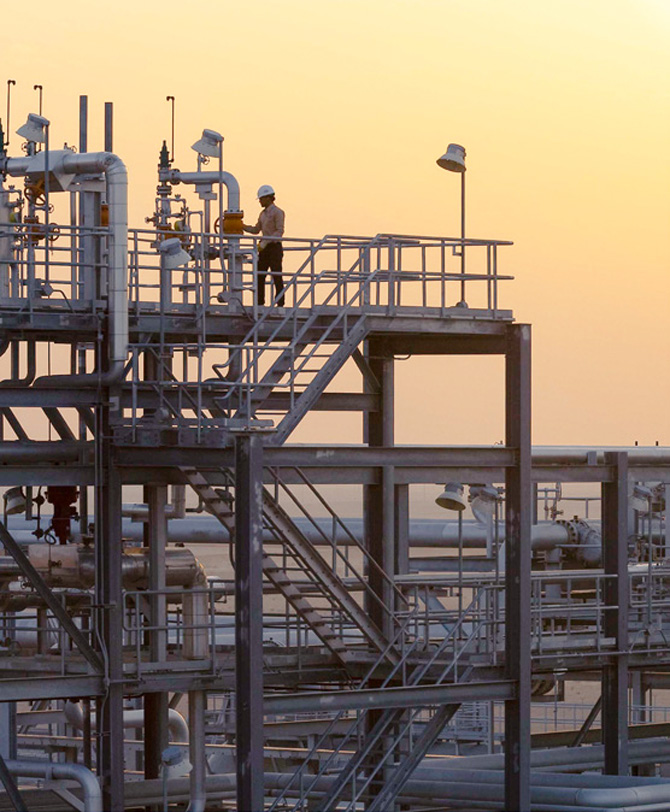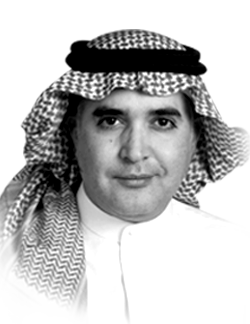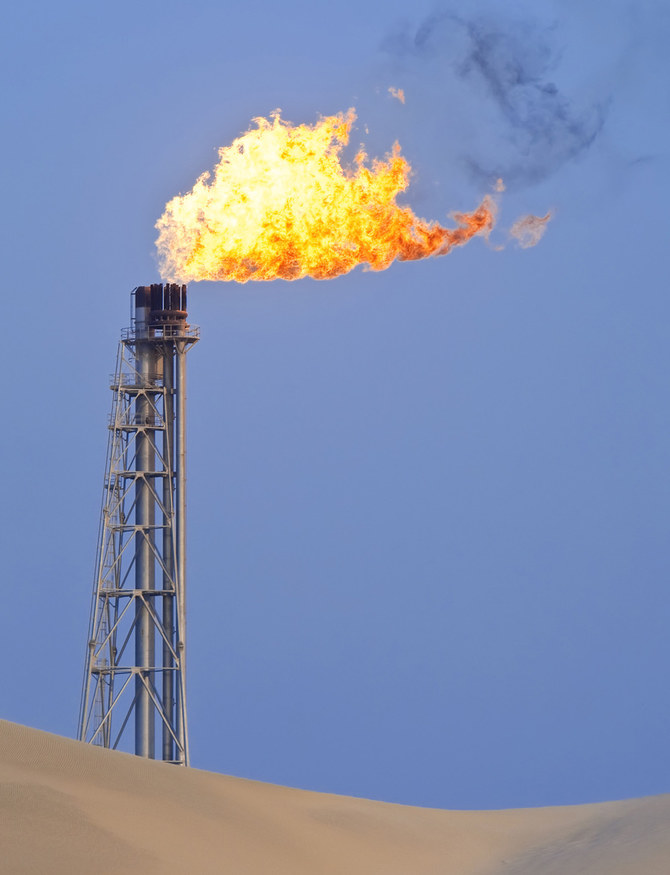Saudi oil has helped lubricate the global economic engine for more than half a century, but its gas reserves are often overlooked. That is all about to change as Saudi Aramco invests $110 billion to develop unconventional gas reserves in the Kingdom’s Jafurah field, located southeast of Ghawar, the world’s biggest conventional oilfield.
For several weeks, Saudi Energy Minister Prince Abdul Aziz bin Salman had been hinting at a major shake-up of the Kingdom’s domestic energy sector in which gas is likely to play a central role.
“Soon you will hear about the ability of the Kingdom to be a gas exporter,” he said earlier this week.
Saudi Aramco said on Saturday that Jafurah held an estimated 200 trillion cubic feet of gas with production to begin early in 2024, reaching about 2.2 billion standard cubic feet per day by 2036. The oil giant said it had about 425 million standard cubic feet per day of ethane, and expects to generate 550,000 barrels per day of gas liquids and condensates.
FASTFACT
233.8 trillion
Standard cubic feet of gas held by Saudi Aramco at the end of 2018
Plans for the field were reviewed by the Saudi High Commission for Hydrocarbons in a meeting chaired by Saudi Crown Prince Mohammed bin Salman.
Over 22 years, Jafurah could generate $8.6 billion in annual income and contribute $20 billion to the Kingdom’s gross domestic product per year. The Saudi crown prince has ordered that the gas produced at the field should be prioritized for domestic industry.
The discovery has ramifications not only for Saudi Arabia and its journey toward a cleaner energy mix, but also for the global gas market, where a slew of recent discoveries in the Eastern Mediterranean is rapidly reshaping economies from Cairo to Ankara, fueling fierce rivalries in the process.
“The start-up of Saudi Arabian exports could mark a major change to the global liquefied natural gas (LNG) balance in the second half of the decade given the size of the country’s conventional and unconventional gas resources,” James Waddell, senior global analyst at London-based Energy Aspects, told Arab News.
Opinion
This section contains relevant reference points, placed in (Opinion field)
But to really understand how gas could change Saudi Arabia’s future, it is worth recounting how it has already shaped the Kingdom’s past.
The image of flames rising from a pipe in a desert is one that often springs to mind when people think about the oil industry — but it is typically gas, not oil, that produces that distinctive and dramatic sight.
For decades gas was little more than an unwanted by-product of the oil industry, mainly because it was in the wrong place.
Demand lay thousands of miles away in the cities of Europe, Asia and North America — too far to be transported practically or profitably by pipeline. So, instead, it was burned off at the wellhead during the drilling process in a practice known as “flaring.”
That all changed in 1976 when a company called the Saudi Basic Industries Corporation was established by a royal decree. Back then, SABIC, the acronym by which most people now know it, was just a single-room office with six people. Before it was established, the Saudi government had already started selecting its brightest young school-leavers to develop the skills needed for industrialization.
The University of Colorado’s 1973 chemical engineering graduation records display the names of a number of young Saudis who would go on to work at SABIC and other petrochemical companies in the Kingdom, including Mohammed Al-Mady, one of the company’s original employees who would later become CEO.
Politics, as well as economics, was a factor in gas becoming such an important part of Saudi Arabia’s early industrial history
In the autumn of that year, when the Saudi graduates had left the snow-covered campus of Boulder for the last time, the world found itself in the middle of an oil crisis triggered by the Arab-Israeli war.
The ensuing OPEC-led oil embargo against countries perceived to have supported Israel during the conflict sent the price of gasoline soaring in the US and put companies such as Shell, already then a long-term investor in the Saudi oil industry, in a difficult position.
Against this tense backdrop, the Saudi government of the time made clear it wanted to send oil only to companies that would help it industrialize. Later, Shell would become one of SABIC’s first big joint venture partners, building a $3 billion petrochemical plant in what is now the industrial city of Jubail.
The story only made a few paragraphs on the last page of The New York Times business section on July 9, 1980, yet it bookmarked a turning point in the history of the country and the emergence of SABIC as a global industrial player.
In the space of a few years, a waste product had become a source of wealth.
It was to become a template of sorts for the subsequent stellar growth of SABIC, with Saudi Arabia trading oil for the technical expertise of multinationals across petrochemicals, steel and fertilizers.
Since then, SABIC has been one of the biggest beneficiaries of Saudi gas reserves, growing from that single Riyadh office with six employees in 1976 to becoming one of the world’s biggest chemical companies, employing 33,000 people worldwide, and building the industrial cities of Jubail and Yanbu in the process.
From oil industry waste product, to petrochemical raw material, Saudi gas is now entering its third chapter.

Gas reserves near the Kingdom’s vast Ghawar oilfield could generate up to $8.6 billion annually. (Supplied)
While the plot and principal characters have only been partially revealed, we know that it is likely to become both an export and a source of domestic power generation, a stepping stone toward a cleaner energy mix that will include more solar and wind power.
“Despite plans to meet Saudi Arabia’s growing power demand through gas and renewable energy generation, the country also has a high potential to have excess gas produced in the coming years that can be exported,” GlobalData power analyst Somayeh Davodi told Arab News.
“Saudi Aramco has already completed a number of gas processing projects and has been able to successfully meet its growing domestic gas demand during past decades. The company is adding more than 2.5 billion cubic feet per day (bcfd) to its already existing gas plants capacity in few years time, increasing the country’s gas processing capacity to 18.9 bcfd by 2022.”
The massive increase in gas processing capacity in the Kingdom is taking place at a time of similar upheaval in the global gas market.
Major finds in the Eastern Mediterranean over the past decade are stoking political tensions as Egypt, Israel, Cyprus, Turkey and Lebanon all seek to establish sovereignty over recently discovered gas reserves.
The emergence of these new players in the global industry also threatens the dominance of top exporters Russia, which has long been the main supplier to Europe, and Qatar, the world’s biggest supplier of LNG.
This complex mix of economic and political tensions has led some analysts to predict that gas and not oil will be the source of the next big regional conflict.
FASTFACT
33,000
Number of people SABIC employs worldwide
Whether or not that turns out to be true, we know that demand for gas is rising as an alternative energy source in Middle East economies transitioning away from oil, as a petrochemical raw material, and as an alternative to increasingly undesirable coal-fired power plants in countries such as China and India.
In addition to the estimated 233.8 trillion standard cubic feet of gas held by Saudi Aramco at the end of 2018, the Kingdom last year also announced the discovery of large amounts of gas in the Red Sea. The size and significance of this find is not yet known.
In its most recent gas sector report, the Paris-based International Energy Agency said that after another record, global demand for natural gas is set to keep growing over the next five years, driven by consumption in fast-growing Asian economies.
Saudi Arabia’s investment in its gas reserves is part of a broader move away from reliance on oil industry revenues that have dipped sharply since 2014. That has had a major impact on government revenues across the Gulf and created a new urgency for energy sector reform — with some countries more exposed to that downward trend in oil prices than others — depending in part on their production costs.
“Saudi Arabia’s oil production costs are among the lowest in the world, in the order of $5 per barrel,” Dan Klein, head of scenario planning analytics at S&P Global Platts, said. “Even under a scenario where global oil demand and price declines sharply, the Saudi oil industry will remain extremely profitable.”
As the outlook for global oil consumption continues to be buffeted by everything from the rise of the US shale industry to the decline of the combustion engine and even the spread of the coronavirus, the Kingdom’s investment in its gas resources offers a hedge to this volatility and uncertainty around the future role of crude oil in the global economy.
Gas helped to establish industry in Saudi Arabia almost half a century ago. Now it looks likely to pay an equally pivotal role in the Kingdom’s next phase of economic evolution — at home and overseas.

















